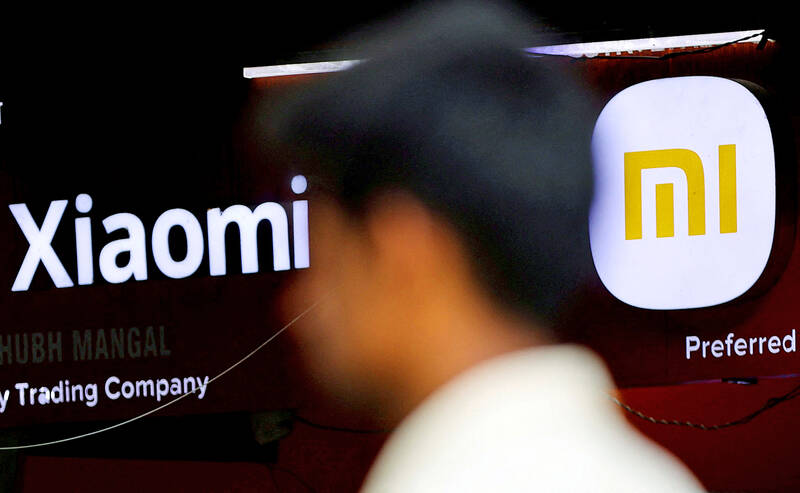Xiaomi Corp (小米) is increasing local sourcing in India, where the Chinese smartphone company seeks to regain market share it lost amid heightened regulatory scrutiny and stiff competition.
Xiaomi has contracted homegrown Optiemus Electronics Ltd to make its bluetooth neckband earphones — the first time an Indian supplier is to make an audio product for the Beijing-based tech giant, Xiaomi India president Muralikrishnan B said in an interview.
“This marks our entry into a whole new set of categories,” Muralikrishnan said late last week at an Optiemus factory in the Noida suburb of the capital New, Delhi. “We see this as a milestone, as further proof of our commitment to making in India.”

Photo: Reuters
Xiaomi led India’s smartphone market for years, but allegations of money laundering and increased state scrutiny contributed to a decline of more than 20 percent in its shipments in the country last year, research firm Counterpoint has said.
It ranked third in the final quarter of last year, also hurt by tough competition, component shortages and an excessively wide product portfolio that confused customers and retailers.
South Korean rival Samsung Electronics Co beat Xiaomi to the top spot in the period, and has since reinforced its manufacturing push in India by locally building its fold and flip smartphones, as well as its Galaxy S23 flagship.
Xiaomi is betting on the growing demand for smart TVs, bluetooth earphones and other accessories to boost revenue in the country.
“The Xiaomi partnership reflects the steady rise of homegrown companies, which are capable of feeding not just India’s demand, but can also export to the global market,” said Nitesh Gupta, a director at Optiemus, which also counts Apple Inc’s Taiwanese supplier Wistron Corp (緯創) as a strategic partner.

Semiconductor business between Taiwan and the US is a “win-win” model for both sides given the high level of complementarity, the government said yesterday responding to tariff threats from US President Donald Trump. Home to the world’s largest contract chipmaker, Taiwan Semiconductor Manufacturing Co (TSMC, 台積電), Taiwan is a key link in the global technology supply chain for companies such as Apple Inc and Nvidia Corp. Trump said on Monday he plans to impose tariffs on imported chips, pharmaceuticals and steel in an effort to get the producers to make them in the US. “Taiwan and the US semiconductor and other technology industries

A start-up in Mexico is trying to help get a handle on one coastal city’s plastic waste problem by converting it into gasoline, diesel and other fuels. With less than 10 percent of the world’s plastics being recycled, Petgas’ idea is that rather than letting discarded plastic become waste, it can become productive again as fuel. Petgas developed a machine in the port city of Boca del Rio that uses pyrolysis, a thermodynamic process that heats plastics in the absence of oxygen, breaking it down to produce gasoline, diesel, kerosene, paraffin and coke. Petgas chief technology officer Carlos Parraguirre Diaz said that in

SMALL AND EFFICIENT: The Chinese AI app’s initial success has spurred worries in the US that its tech giants’ massive AI spending needs re-evaluation, a market strategist said Chinese artificial intelligence (AI) start-up DeepSeek’s (深度求索) eponymous AI assistant rocketed to the top of Apple Inc’s iPhone download charts, stirring doubts in Silicon Valley about the strength of the US’ technological dominance. The app’s underlying AI model is widely seen as competitive with OpenAI and Meta Platforms Inc’s latest. Its claim that it cost much less to train and develop triggered share moves across Asia’s supply chain. Chinese tech firms linked to DeepSeek, such as Iflytek Co (科大訊飛), surged yesterday, while chipmaking tool makers like Advantest Corp slumped on the potential threat to demand for Nvidia Corp’s AI accelerators. US stock

SUBSIDIES: The nominee for commerce secretary indicated the Trump administration wants to put its stamp on the plan, but not unravel it entirely US President Donald Trump’s pick to lead the agency in charge of a US$52 billion semiconductor subsidy program declined to give it unqualified support, raising questions about the disbursement of funds to companies like Intel Corp and Taiwan Semiconductor Manufacturing Co (台積電). “I can’t say that I can honor something I haven’t read,” Howard Lutnick, Trump’s nominee for commerce secretary, said of the binding CHIPS and Science Act awards in a confirmation hearing on Wednesday. “To the extent monies have been disbursed, I would commit to rigorously enforcing documents that have been signed by those companies to make sure we get